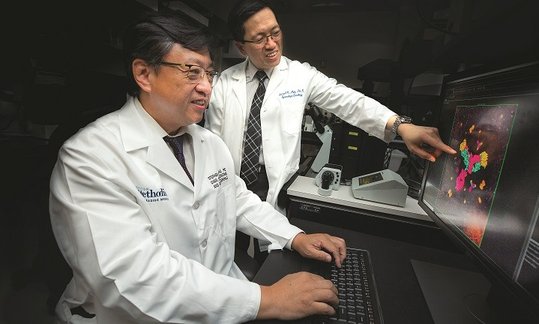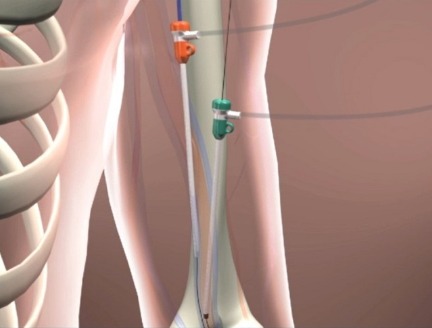


Clinical Research
Antibody to Fight Silent Killers
Joining forces to block MFAP5 protein in killer cancers
Stephen Wong, PhD, from Houston Methodist Cancer Center, and Samuel Mok, PhD, from The University of Texas MD Anderson Cancer Center, collaborated to create an antibody as a new type of immunotherapy.
Known as two of the most lethal cancers, ovarian and pancreatic cancers are called “silent killers,” often going undetected until too late to treat. Taking on this challenge, two cancer scientists at Houston Methodist and The University of Texas MD Anderson Cancer Center have diligently sought more effective late-stage treatments, resulting in their creation of a new monoclonal antibody.
In a study published in the July 22 issue of Clinical Cancer Research, co-corresponding authors Stephen T.C. Wong, PhD, from Houston Methodist Cancer Center, and Samuel Mok, PhD, from The University of Texas MD Anderson Cancer Center, reported finding a new type of immunotherapy to fight the two deadly malignancies. They developed the monoclonal antibody to block the action of a protein, called MFAP5, which is secreted by the cells surrounding and supporting tumors in these two malignant cancers.

The MFAP5 protein appears to trigger the formation of the surrounding elements that supply and stimulate the tumor as it grows and spreads. The monoclonal antibody 130A developed and patented by Wong and Mok is able to block MFAP5, pre-venting new blood vessels and excess tissue from forming and thereby cutting off the tumor’s support for continued growth.
We found that blocking MFAP5 enhances the effectiveness of chemotherapy treatments and suppresses tumor growth in ovarian and pancreatic cancers, as well as inhibits progression of these two cancers in mice. This new immunotherapy drug targets supporting cells surrounding a tumor rather than just the tumor cells alone.

Stephen Wong, PhD
John S. Dunn, Sr. Presidential Distinguished Chair in Biomedical Engineering
Professor of Computer Science and Bioengineering in Oncology
Cancer Center
Houston Methodist
Mok, endowed professor of gynecologic oncology and reproductive medicine at MD Anderson, states, “MFAP5 promotes fibrosis in ovarian and pancreatic cancers, and fibrosis pro-motes progression, chemoresistance and reduces survival of people with these cancers. By blocking this secretory protein with an antibody, we can treat the tumor by targeting multiple cellular types—fibroblasts and blood vessels—in the tumor microenvironment.”
Having demonstrated the feasibility of using their monoclonal antibody to target MFAP5, the researchers are in the process of designing and generating an anti-MFAP5 antibody that can be used as a treatment in humans. They aim to have it ready for efficacy and toxicity testing by the end of 2019 and begin a Phase I clinical trial in 2020.
”The convergence of biological science, computational science and engineering has allowed us to achieve such translational discovery,” Wong said.
Yeung TL, Leung CS, Yip KP, Sheng J, Bover L, Maitra A, Birrer MJ, Wong STC, and Mok SC. Anticancer immunotherapy by MFAP5 blockade inhibits fibrosis and enhances chemosensitivity in ovarian and pancreatic cancer. 2019 July 22, Clinical Cancer Research, DOI: 10.1158/1078-0432.CCR-19-0187.
This study was supported in part by grants from NIH (U54CA149196, U54CA151668, U01188388, RO1CA133057, RO1CA142832, RC4CA156551, CA177909 and UH2 TR000943); The University of Texas MD Anderson Cancer Center Ovarian Cancer Specialized Program of Research Excellence grant P50CA083639 from the NIH; the U.S. Department of Health and Human Services; the Ting Tsung and Wei Fong Chao Foundation; John S. Dunn Research Foundation; Gilder Foundation; the Ovarian Cancer Research Program, U.S. Department of Defense (W81XWH-17-1-0126, W81XWH-17-1-0146 and W81XWH-16-1-0038); and funding support from the Mary K. Chapman Foundation and the Ovarian Cancer Research Fund. The Monoclonal Antibodies Core Facility is supported by the Cancer Center Support Grant NCI P30CA016672.
Lisa Merkl, October 2019








